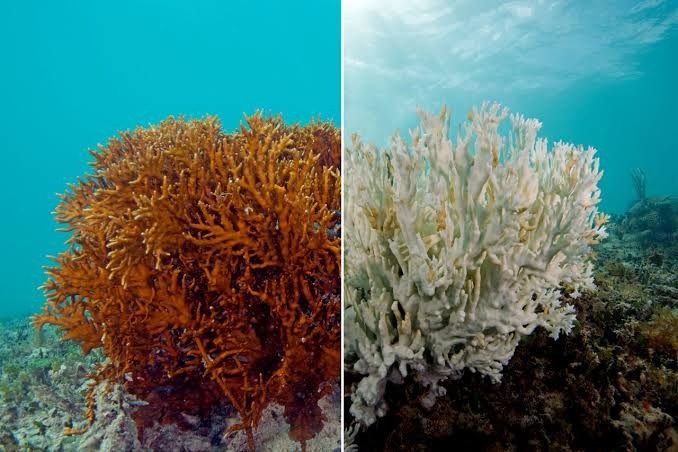🔷 Coral Decline in Lakshadweep
A recent study has shown a significant decline in coral cover in the Lakshadweep archipelago, with coral reefs reducing by nearly 50% over 24 years — from 37.24% in 1998 to just 19.6% in recent measurements. This indicates serious ecological stress in this fragile marine ecosystem.
🔷 What are Corals?
Corals are invertebrate marine animals from the phylum Cnidaria. They are made up of tiny, soft-bodied organisms called polyps, which secrete calcium carbonate to form hard, protective exoskeletons. Over time, millions of polyps build massive structures known as coral reefs. Corals derive their vibrant colors from symbiotic algae called zooxanthellae. There are three major types of coral reefs:
Fringing reefs – form along coastlines Barrier reefs – develop offshore in open water Atolls – circular reefs formed around submerged volcanic islands
In India, major coral reef regions include the Gulf of Kutch, Gulf of Mannar, Andaman & Nicobar Islands, Lakshadweep, and Malvan.
🔷 Ecological Significance of Coral Reefs
Coral reefs are vital for marine biodiversity, providing food, shelter, and breeding grounds for nearly 25% of all marine species. They act as natural nurseries for fish and other marine life. Reefs also support over 1 billion people globally who depend on them for food, income, and recreation, especially in coastal communities.
🔷 Causes of Coral Bleaching and Decline
Climate Change and Marine Heatwaves – Elevated sea surface temperatures stress corals, breaking their symbiosis with algae and leading to mass bleaching. Ocean Acidification – Higher CO₂ levels lower ocean pH, reducing corals’ ability to build their calcium carbonate skeletons. Pollution – Agricultural runoff with fertilizers, pesticides, and heavy metals degrades coral health. Physical Disturbance – Coastal development, sedimentation, coral mining, and unsustainable fishing physically damage reef structures. Overfishing – Reduces reef fish populations, disturbing ecological balance and increasing algae overgrowth.
🔷 Can Corals Recover?
Yes, corals can recover from bleaching if environmental conditions stabilize, especially temperature. Once favorable conditions return, the symbiotic algae re-inhabit the corals, helping them regain color and health over time.











